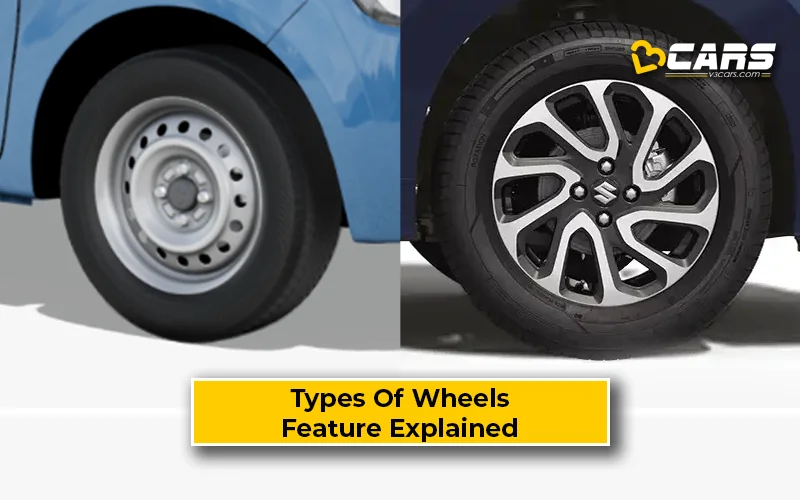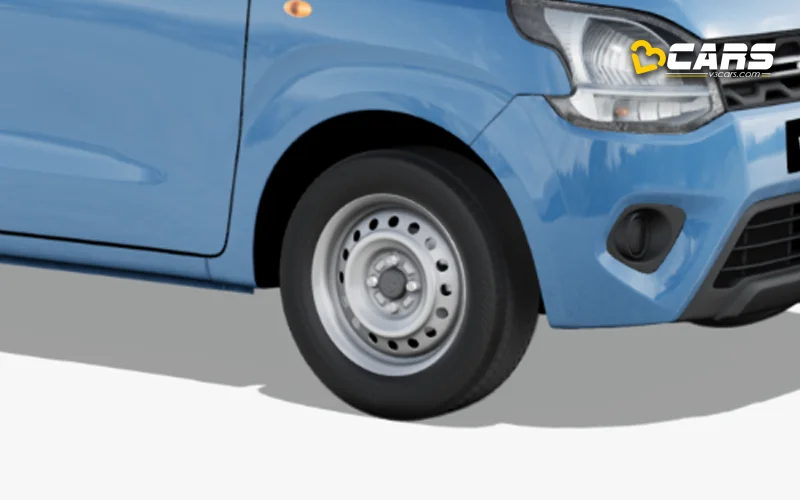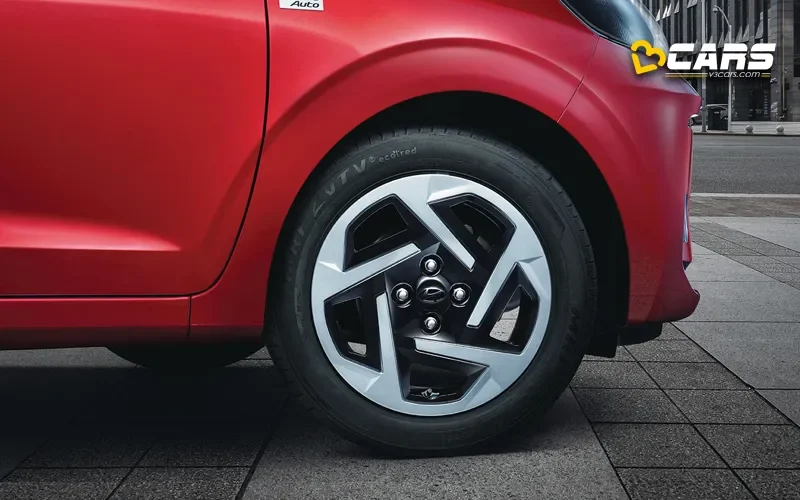Types Of Wheels In A Car – Feature Explained
The wheels on your car are more than just what keeps it rolling; they significantly impact its aesthetics, handling, and even performance. From basic steel to stylish alloys, understanding the different types of wheels available can help you make informed decisions, whether you're buying a new car or considering aftermarket upgrades. Let's break down the common types of car wheels:

1. Steel Wheels

What They Are: Steel wheels are the most basic and often the standard option on entry-level vehicles and spare tyres. They are typically made from stamped steel components welded together.
How They Work: They provide a strong and functional platform for mounting tyres. Their weight contributes to rotational mass.
What Are The Pros Of Steel Wheels?
- Cost-Effective: They are the cheapest type of wheel to manufacture, making them the most affordable option.
- Durable and Robust: Steel is a strong material that can withstand rough road conditions and impacts relatively well.
- Easy to Repair: Minor damage like bending can often be repaired relatively easily and inexpensively.
What Are The Cons Of Steel Wheels?
- Heavy: Steel wheels are significantly heavier than alloy wheels, contributing to higher unsprung weight, which can negatively impact handling and fuel efficiency.
- Aesthetically Less Appealing: They generally have a plain and utilitarian appearance.
- Susceptible to Rust: Steel is prone to rust and corrosion, especially in humid climates or areas with road salt.
Aftermarket Fitment Procedure: Aftermarket steel wheels are readily available in standard sizes. The fitment procedure involves ensuring the bolt pattern (PCD - Pitch Circle Diameter), center bore, and offset match your vehicle’s specifications. It’s a straightforward process, often requiring just basic tools.
Aftermarket Costs: Aftermarket steel wheels are the most budget-friendly option, typically ranging from Rs. 2,000 to Rs. 5,000 per wheel depending on size and brand.
2. Styled Steel Wheels (with Full Wheel Covers)

What They Are: These are essentially standard steel wheels designed with some aesthetic considerations, often featuring embossed patterns or shapes. They are almost always paired with full wheel covers.
How They Work: The steel wheel provides the structural integrity, while the plastic wheel cover is primarily for cosmetic enhancement and sometimes aerodynamic benefits.
What Are The Pros Of Styled Steel Wheel Covers?
- More Aesthetically Pleasing than Basic Steel: The wheel covers can significantly improve the visual appeal of the vehicle, mimicking the look of alloy wheels at a lower cost.
- Cost-Effective: Still more affordable than alloy wheels.
- Protection from Elements: Wheel covers can offer some protection to the steel wheel from dirt, debris, and minor corrosion.
What Are The Cons Of Styled Steel Wheel Covers?
- Still Relatively Heavy: The underlying steel wheel contributes to unsprung weight, thus affecting fuel efficiency.
- Wheel Covers Can Be Damaged or Lost: Plastic wheel covers are susceptible to cracking, breaking, or even falling off, especially during impacts or rough driving.
- Limited Styling Options: While varied, the styling options are limited by the design of the wheel covers.
Aftermarket Fitment Procedure: Replacing styled steel wheels usually involves matching the size and bolt pattern. Aftermarket wheel covers are specific to wheel size and attachment type (usually clip-on). Ensure the covers are compatible with your steel wheels.
Aftermarket Costs: Aftermarket styled steel wheels might have a slight premium over basic steel wheels. Wheel covers can range from ₹500 to ₹2,000 per piece depending on material, design, and brand.
3. Alloy Wheels (Painted)
.webp)
What They Are: Alloy wheels are made from a blend of lightweight metals, typically aluminium or magnesium alloys. Painted alloy wheels feature a layer of paint for aesthetic purposes and protection.
How They Work: Their lighter weight reduces unsprung mass, leading to improved handling, quicker acceleration, and better fuel efficiency. The design allows for better brake cooling.
What Are The Pros Of Painted Alloy Wheels?
- Lightweight: Significantly lighter than steel wheels, improving performance and fuel economy.
- Enhanced Handling: Reduced unsprung weight allows for better suspension response and road holding.
- Improved Aesthetics: Offer a wide range of stylish designs and finishes. Paint allows for various colour options.
- Better Brake Cooling: Open designs often improve airflow to the brakes, reducing heat buildup.
- Corrosion Resistance: Aluminium alloys are naturally more resistant to corrosion than steel (though the paint layer provides additional protection).
What Are The Cons Of Painted Alloy Wheels?
- More Expensive: Alloy wheels are significantly more costly to manufacture and purchase than steel wheels.
- More Susceptible to Damage: While strong, they can be more prone to damage like bending or cracking from hard impacts, and repairs can be more complex and expensive.
- Paint Can Chip or Scratch: The painted finish can be susceptible to chips and scratches.
Aftermarket Fitment Procedure: When fitting aftermarket painted alloy wheels, meticulous attention to the bolt pattern (PCD), center bore, offset, and wheel diameter is crucial. Incorrect fitment can lead to safety issues and damage. Professional installation is often recommended.
Aftermarket Costs: Aftermarket painted alloy wheels can range from Rs. 4,000 to rs. 30,000 or more per wheel, depending on size, design, brand, and quality.
4. Alloy Wheels (Machined-Cut)
.webp)
What They Are: Machined alloy wheels are a type of alloy wheel where parts of the surface have been machined to a bright, metallic finish, often contrasting with painted sections. This creates a multi-tone and often more intricate look. They are typically clear-coated to protect the machined surfaces.
How They Work: Similar to painted alloy wheels, they offer weight reduction and improved performance. The machined areas are purely cosmetic.
What Are The Pros Of Machine-Cut Alloy Wheels?
- Striking Aesthetics: The combination of machined metal and paint creates a visually appealing and often premium look.
- Lightweight and Performance Benefits: Share the performance advantages of other alloy wheels.
- Better Brake Cooling: Design often allows for good airflow to the brakes.
- Corrosion Resistance: The underlying alloy is corrosion-resistant, and the clear coat protects the machined areas.
What Are The Cons Of Machine-Cut Alloy Wheels?
- Most Expensive: Machined alloy wheels are often the most expensive type of wheel due to the complex manufacturing process.
- Repair Can Be Complex: Repairing damage to machined areas can be challenging to match the original finish and may require specialized techniques.
- Susceptible to Clear Coat Damage: The clear coat protecting the machined areas can be scratched or damaged, leading to potential corrosion or discoloration of the bare metal.
Aftermarket Fitment Procedure: Similar to painted alloy wheels, precise fitment is critical. Ensure the bolt pattern (PCD), center bore, offset, and wheel diameter match your vehicle’s specifications. Professional installation is highly recommended to avoid damage and ensure proper fitment.
Aftermarket Costs: Aftermarket machined alloy wheels are generally the priciest, ranging from ₹6,000 to ₹50,000 or more per wheel, depending on size, design, brand, and complexity of the machining.
How To Make The Right Choice Of Wheels For Your Car?
The best type of wheel for your car depends on your budget, priorities, and driving needs. If cost and durability are paramount, steel wheels (possibly with covers) are a practical choice. For those seeking improved aesthetics and performance, alloy wheels offer a significant upgrade. Painted alloys provide a wide range of styling options, while machined alloys offer a more premium and intricate look. When considering aftermarket upgrades, always prioritise correct fitment and consult with professionals to ensure safety and optimal performance.
Note: Check your Car EMI with our - Car Loan EMI Calculator
You can use our Fuel Cost Calculator to see how much any petrol, diesel or CNG car will cost to run based on the latest fuel price in your city.


0 Comments